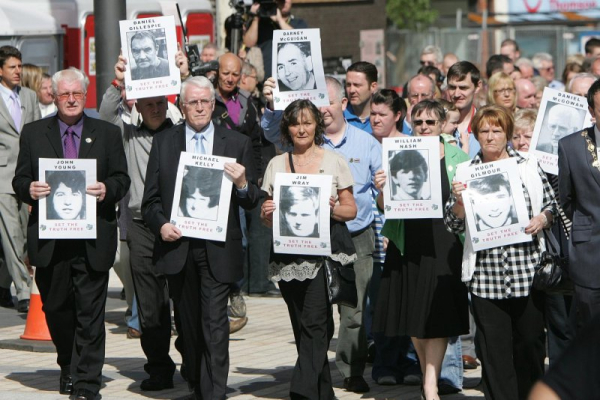

Familles and friends of those who where killed on Bloody Sunday in 1972, marched from Bogside to the Guildhall Square for the final outcome of the Bloody Sunday Inquiry in 2010, in Derry, Northern Ireland. On Thursday, a Belfast court found Soldier F not guilty of the murders of protesters on Bloody Sunday in 1972. File Photo by EPA
The British army veteran known as Soldier F was found not guilty Thursday for his part in the Bloody Sunday killings in Derry, Northern Ireland, in 1972.
Soldier F was acquitted of all charges in Belfast for his part in the day when he and his parachute troop shot and killed 13 protesters.
Judge Patrick Lynch said the prosecution failed to prove its case. Soldier F is the only British army veteran ever charged for Bloody Sunday. His identity was shielded by a court order.
Soldier F pleaded not guilty to the murders of two protesters, James Wray, 26, and William McKinney, 22. He was also charged with attempted murder of five other protesters.
Soon after the killings, a formal inquiry cleared the soldiers. But in 2010, an investigation found that they had shot people who didn’t pose a threat to them and then lied for years to cover it up. Then-Prime Minister David Cameron issued an apology.
The evidence was the main issue, the judge said.
“To convict it has to be upon evidence that is convincing and manifestly reliable,” Lynch said. “The evidence presented by the crown falls well short of this standard and signally fails to reach the high standard of proof required in a criminal case; that of proof beyond a reasonable doubt. Therefore, I find the accused not guilty on all seven counts on the present bill of indictment.”
Lynch said the soldiers had “lost all sense of military discipline” and shot unarmed civilians fleeing from them. “Those responsible should hang their heads in shame,” The Guardian reported he said.
But the issue on trial was the individual guilt of one man. The testimony from soldiers G and H was unreliable and decades old, Lynch said. He found that Soldiers G and H had been “serially untruthful.”
The case presented “complex legal and evidential issues, said Stephen Herron, director of public prosecutions, the BBC reported. He said that “the challenges of prosecuting legacy cases are well-documented.”
“Our thoughts today are foremost with the Wray and McKinney families, those who were wounded, and the loved ones of all killed and injured on Bloody Sunday,” Herron added.
“We understand that today’s outcome comes after a prolonged and painful process for those families.” He gave thanks to the Bloody Sunday families “for the constructive and dignified way they engaged with us over a number of years.”
Mickey McKinney, brother of victim William, said outside the court that the families don’t blame the judge but the British state for the murder and the subsequent cover-up.
“Soldier F has been discharged from the defendant’s criminal dock, but it is one million miles away from being an honourable discharge,” he said.
Northern Ireland’s First Minister Michelle O’Neill said she was disappointed in the not-guilty verdict.
“Fifty-three years ago, the British army indiscriminately murdered civilians on the streets of Derry. Over 15 years ago, the then-British prime minister publicly acknowledged the role of British soldiers on Bloody Sunday. Yet, not one British soldier or their military and political superiors has ever been held to account. That is an affront to justice.”